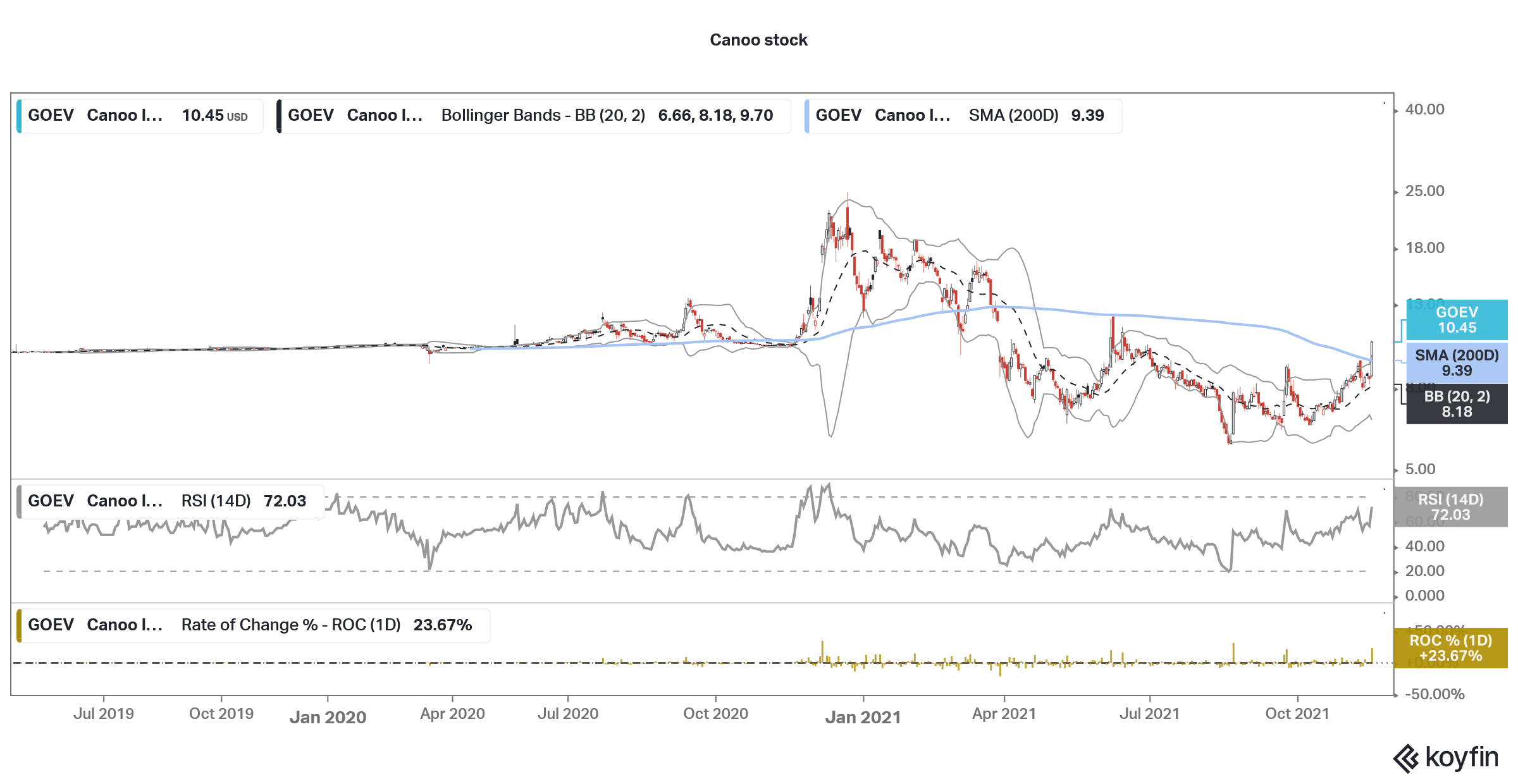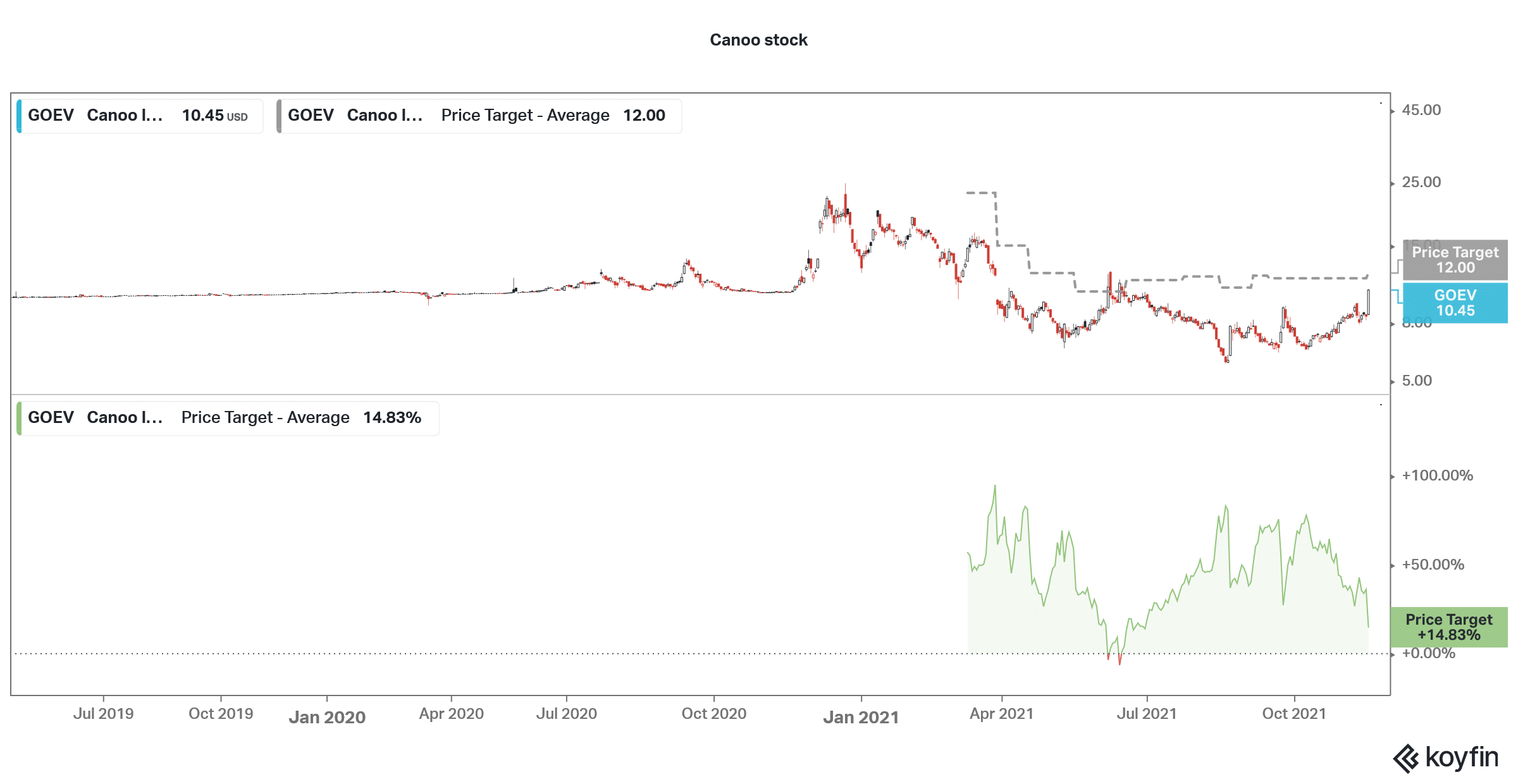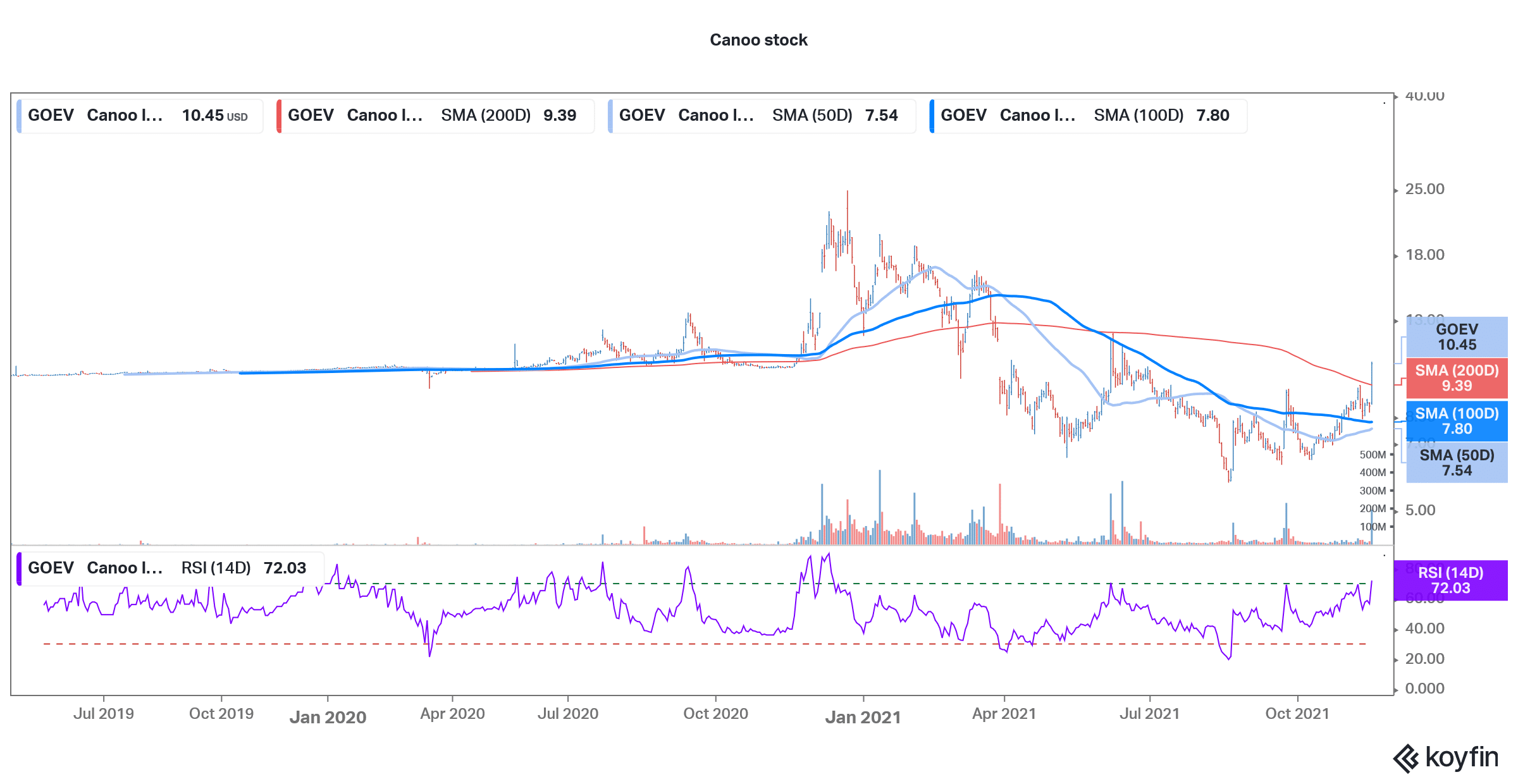Canoo Stock Price Forecast November 2021 – Time to Buy GOEV Stock?
Please note that we are not authorised to provide any investment advice. The content on this page is for information purposes only.
Electric vehicle (EV) stocks have been on a fire over the last month and Canoo (GOEV) also joined the party yesterday with gains of 23%. The stock was also trading higher in US premarket price action today also.
Canoo stock has now surged above the SPAC IPO price of $10. GOEV stock went public through a SPAC merger last year. Several other companies opted for a SPAC reverse merger to go public. While EV (electric vehicle) SPACs were red hot last year, they came under pressure this year. Many EV companies that went public through a SPAC reverse merger fell below the SPAC IPO price of $10. However, Nikola and GOEV have managed to move above the SPAC IPO price. However, Lightning Emotors and Lordstown Motors are still languishing below the $10 price level. What’s the forecast for GOEV stock after the recent rally?
Canoo stock recent developments

Startup EV companies have been notorious for production hiccups and even Tesla faced a “production hell” when the company was ramping up Model 3 production, the company’s first mass-market model. Meanwhile, Canoo recently announced that it expects to begin production of its first model, named Canoo, by the end of 2022.
“Our discipline continues to be Big News or No News. Therefore, we will accelerate our advanced manufacturing production in the U.S. to begin before Q4 2022,” stated Tony Aquila, Canoo’s CEO.
68% of all retail investor accounts lose money when trading CFDs with this provider
Electric vehicle companies
Notably, nothing pleases markets more than the execution from EV companies. Companies like Lordstown and Nikola, which have faltered on production, have seen a fall in their stock case. In Lordstown Motors’ case, the company has extended its delivery timeline by a year and now expects to begin deliveries next year only. Previously, it was targeting a 2021 production and expected to have the first-mover advantage in the electric pick-up market with its Endurance pickup. Now, the model would hit the roads after Ford’s F-150 Lightning, whose current avatar has been North America’s best-selling pickup for decades.
GOEV stock forecast
The forecast for the EV industry looks positive and if Canoo can come up with a good product proposition and achieve production scale, the stock could rise even further. One of the biggest risks for EV startups like GOEV is the competition risk. The market is getting overcrowded. Almost all the legacy automakers are investing heavily in vehicle electrification. Then, we also have incumbent pure-play EV companies like Tesla, NIO, and Xpeng Motors. There is also a flurry of startup EV companies including Canoo, Fisker, Rivian, Lucid Motors, and Nikola.
EV startup companies like Canoo also face the execution risk as they have to prove their mettle by producing and delivering cars that can grab the attention of consumers in what would be an overcrowded EV market over the next couple of years.

Canoo stock long term forecast
Of the four analysts covering Canoo stock, two have a buy rating while one each rate it as a hold and sell. Its median target price is $12, which is a 14.8% premium over current prices. Its street high target price is $19, which is a premium of 81.8%, however, the street low target price of $5 is a discount of 52% from these levels.
At the investor day earlier this year, Canoo tried to pitch itself as a long-term investment. “We’re in it for the long run. I’m in it for the long run,” said Aquila at the event.
“We don’t concentrate on day trades. We concentrate on fundamentals,” he said speaking with CNBC. Aquila added, “Companies, their stock doesn’t always immediately reflect what they’ve done.”
Meanwhile, Wall Street, as well as the markets, were not too impressed. While Bank of America analyst John Murphy called the event “as relatively constructive,” he added, “We remain a bit hesitant as the company still has no binding orders and its business model still appears to be evolving.”
GOEV stock is below its 52-week highs
Notably, despite the recent rise, Canoo stock is down 16% for the year and trades at less than half of its 52-week highs. The stock has risen after the business update which shows that the company is advancing on the business plans. However, it still needs to assemble and deliver these cars. The announcement came at a time when there has been a euphoria in the EV sector. While Tesla’s market cap has crossed above $1 trillion, Rivian’s market cap is approaching $150 billion. Even Lucid Motors’ valuation is getting close to $100 billion.
As for production, EV companies have taken two approaches. While companies like NIO and Fisker have gone for third-party tie-ups, Tesla, Lucid Motors, and Rivian have built their own plants. Tesla even owns the massive Supercharging network, and the total number of Superchargers globally has surpassed 30,000. Meanwhile, Canoo has gone for a dual approach and has partnered with VDL Nedcar while also focusing on its own manufacturing facility.

GOEV stock technical analysis
GOEV stock is looking bullish on the charts and has crossed above the 50-day, 100-day, and 200-day SMA (simple moving average). The 200-day SMA was a key resistance for the stock but it has managed to cross above the price level. However, the 14-day RSI (relative strength index) has risen to 72, which indicates that the stock is now in the overbought zone.






